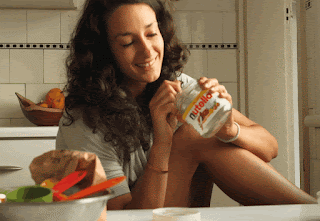David Chancellor: "I'm called a documentary photographer."
In the small lunchtime lecture room at Cape Town School of Photography, we travelled across the Kalahari, Namibia, Zimbabwe, and Kenya with Chancellor's 'Ghost Train.' He described the 'Ghost Train' as a viewer's journey to an unknown place of understanding when viewing some of his images. In his medium format film image, Huntress with Buck, he pointed out that you may see the landscape first, then the girl, then the light, and then wonder about the girl in this landscape. As a viewer, you may not know where the photo story is going until you start to engage with your own observations and relations. The 'Ghost Train' experience left my husband, Chris, and I with a feeling of inspiration and engagement with questions of our own.
 |
| The Huntress with Buck image won the Taylor Wessing Portrait Prize at the National Portrait Gallery, London. |
I was inspired by his technique of 'slow journalism.' By shooting on film, he finds himself engaging more with people than people being more interested in what he is capturing.
"I like the fact that people can't look at the back of the camera and see an image."
"I don't like digital, full stop."
His time spent on the series, Hunter, took years to confront people's suspicions and battled with people's perceptions of why he was taking interest in documenting, "What actually happens in the Hunting Industry?" As a documentary photographer, he looks at subjects that people aren't seemingly familiar with. He develops trust within a culture, an industry, which in return allows him to develop hundreds of rolls of film. By default, his photo series weave a story around human wildlife conflict and tourist trophy hunting.
His sensory process of using film inspires other questions in his work. While shooting Hunter and Hunted, he came in close contact with dead or dying animals. In Safari Club and Diorama and Cases, he explored the 'life' of animals stuffed and put back in their natural form.
He explained that his personal work of Hunter, Hunted and Safari Club took 6 years, 4 of which were shooting. Chancellor wanted to understand after the years of Sir Peter Scott's conservation of wild animals, "Where are we now?"
I recently saw his photo, Untitled Hunter #1, Trophy Room taken in Dallas, Texas at the Wildlife Photography of the Year Exhibition, hosted by NHU Africa and the Iziko Natural History Museum in Cape Town, South Africa.
The photo taken in Texas, as a part of Safari Club series, was the only photo in the Wildlife Photography Exhibition that had only one living animal in the picture; the Untitled Hunter. The photo surfaces debate around conservation, ecology, hunting and invites discussion around Social Ecology and Wildlife Economy. As for the man known as the Untitled Hunter, he has asked David for a print.
Chancellor continued his lunchtime lecture by sharing some of his current unfinished work in Kenya with Rhino poachers and also some 'snaps' of his family.
"As photographers, we should be able to do anything."
"You don't need people to pigeon hole you"
I walked away from David's lecture engaged.
Engaged with the need to question.
Engaged with the want to understand.
And engaged with urge to document.
I'll continue to do so, on all mediums . . . and free from any pigeon holes.











































